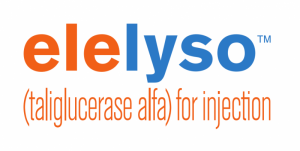Elelyso Side Effects
Serious Side Effects of Elelyso
- high blood pressure or chest tension or pain
- infection of the urinary tract
- flu-like symptoms including chills, a fever, aching of the muscles, and drowsiness
- severe allergic reaction: hives, rash, swelling of the mouth, tongue, throat or face, and trouble breathing
Common Side Effects of Elelyso
- redness, mild inflammation, soreness or itching around the skin where Elelyso was injected
- headache
- feeling dizzy
- runny nose or coughing
- soreness of the throat

- fatigue or tiredness
- aching of the joints or back
- flushing (reddening of the skin)
Warnings & Recalls for Elelyso
Elelyso and Pregnancy
Elelyso has been listed as an FDA pregnancy Category B drug. Elelyso has not been expected to cause harm to the fetus when taken during pregnancy. It is unknown if Elelyso passes through breast-milk or could harm a feeding baby. If you are pregnant, are planning on becoming pregnant, or are breastfeeding, talk to your doctor before using Elelyso.
General Warnings
Patients who are allergic to any ingredient in Elelyso should not use this medicine as a treatment.
Before taking Elelyso, let your doctor know about any medicines, vitamins, supplements, or herbal products you are using, any conditions you may have, or any details about your medical history. Tell all healthcare providers that you are using Elelyso as a treatment, especially if you will be undergoing surgery or will be using any other drugs.
Elelyso Treatment and Use
Elelyso | taliglucerase alfa is an enzyme injection marketed by Pfizer Inc. as a long-term treatment for patients with type 1 Gaucher disease, a condition in which patients suffer from a deficiency of the enzyme, glucocerebrosidase. By treating this disorder, Elelyso may also:
- reduce the risk of bone disease, fractures, aching or pain
- decrease enlargement of the spleen
- treat anemia or other blood disorders related to type 1 Gaucher disease
How Does Elelyso Work?
Patients with type 1 Gaucher disease do not have healthy amounts of glucocerebrosidase in their bloodstream, which causes a buildup of fats in cells and organs. Elelyso works by replacing this enzyme and decreasing side effects related to this condition.
How is Elelyso Given?
Elelyso comes in the form of an intravenous (IV) injection. Elelyso is typically administered by a doctor or nurse in a clinic or hospital setting. The injection is slowly injected into the vein for about 1 or 2 hours depending on the patient’s condition.
You may be asked to self-administer the injection at home. Carefully read and adhere to all label instructions, as well as directions given to you by your doctor. Do not shake the solution or store a mixed solution for later use. If the medicine has changed color or contains any particles, do not use the solution.
Treatment of Elelyso may be continued endlessly to keep the condition under control.
Other Names for Elelyso
Brand name:
Generic name:
Lawsuits & Legal Information for Elelyso
Author:
Lauren Cohrs
Posted on Aug 5, 2012

